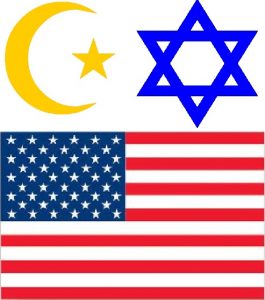 In the United States of America, it is essential to exercise one’s fundamental rights and responsibilities as a citizen to ensure the health and vibrancy of our democracy.
In the United States of America, it is essential to exercise one’s fundamental rights and responsibilities as a citizen to ensure the health and vibrancy of our democracy.
The two of us take our responsibilities to be good citizens seriously, but differently. One of us is an elected official, believing that serving his state and now also his nation, is the best use of his talents and the surest way to effect change. The other is a philanthropist supporting causes that best reflect his values.
Both of us, one Muslim, one Jewish, strongly favor building bridges among communities of faith — and of no faith — of breaking down barriers, and promoting dialogue and understanding.
That endeavor has been more difficult in the past year because of the harsh and divisive language of the presidential campaign and its aftermath. But the American people have spoken through our electoral process, and though many of us did not get the outcome we wanted, we accept that a new administration is in office.
We love our country; we will serve it, defend it and never stop struggling. And, we will work to ensure that we do not lose the soul of America as we redouble our efforts to reject hate and bigotry in all forms, fighting for a fairer, for a stronger, for a more equitable and a more just America. To borrow a phrase from Hillary Clinton, we are stronger together. Together we can help shape a better future.
We can do that through our creeds, our seeds and our deeds.
Our creeds are our faiths, and each of us grew up in a faith that teaches that we are created in God’s image — in Judaism, b’tzelem Elohim; in Islam, ala suratihi — and that we must treat others with dignity and respect. The Hebrew Bible command us, “Love thy neighbor as thyself,” while Muhammad taught, “None of you is truly a Muslim until he loves for his brother what he loves for himself.” For each of us personally, one way in which our creeds manifest themselves is through our involvement in the InterFaith Conference of Metropolitan Washington, a nonprofit that brings together 11 faith communities for dialogue and social justice advocacy.
Regardless of religious tradition, every citizen, every resident of this nation can plant seeds. We plant those seeds when we teach our children about our democracy and its freedoms of religion, press and the right to peaceful assembly. We plant those seeds when we talk to them about the strength of our constitution, and help them to understand that while our nation has made tremendous progress in becoming more equitable, too many remain marginalized and we must never stop striving to do more.
Our deeds are the actions we take, the advocacy that we do and the steps we take — including working to find common ground with those with whom we disagree — to ensure that our nation is a fair and welcoming place.
At this point in our nation’s history, the office of citizen includes a responsibility to get to know our neighbors and to express our American values by reaching out to those who are feeling alienated or displaced by recent political rhetoric and by defending the rights of all religious and ethnic minorities to participate fully in American life.
As concerned citizens we should not only plant seeds, we also should define ourselves through our deeds. We need to advocate and take actions to make a more perfect union and to collaborate with others in doing so.